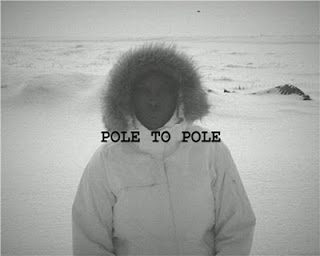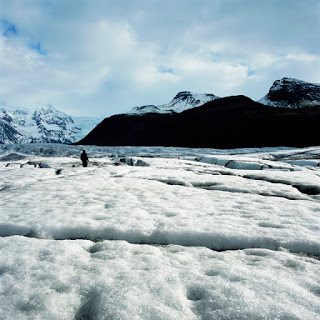
Grace Ndiritu, Pole to Pole
At the end of last month I was invited by the Stuart Hall Library Research Network to present my doctoral research titled, Contemporary Visual Representations of the Non-White Figure in the Arctic Landscape: British Colonial Constructions of the ‘Heart of Whiteness’ and the Black-White Binary as Fetish. Since commencing my PhD studies in late 2012, I have become increasingly aware of the importance of exposing my research and entering into dialogue with fellow practitioners. Therefore, I was delighted to be provided with the opportunity to present my work within the relevant context of the Stuart Hall Library and its research network members.
My investigation is focused on three specific case studies of artist film and video – each from Black–British filmmakers– that use the Arctic landscape as a setting to discuss issues of ethnicity, memory and belonging. Framed in the context of the British colonial construction of the Arctic territories and their place in the public imagination, my aim is to unearth the significance of the artists’ appropriation of Arctic space. The case studies include John Akomfrah’s Mnemosyne [2010]; Grace Ndiritu’s Pole to Pole [2009] and Issac Julien’s True North [2004].

Isaac Julien, True North
Further to my presentation to the group, the evening’s respondent Dr Saer Maty Ba began to unpack the layers of my research and identified several key concepts and theories which will be integral to a thorough reading of the artist’s works, providing particular insight into the practice of John Akomfrah. As Roshini Kempadoo has stated in her earlier blog post, we anchored the discussion with the question why now; what is the significance of the artists appropriating Arctic space at this point in time and can the works be read in relation to current European anxiety surrounding nationalism and notions of purity? From this point we began to discuss the intricacies of the individual works including notions of racial binary; the seductiveness of the film footage and the ethics involved in the appropriation of ethnographic archive material.
The evenings’ group covered a diverse range of backgrounds from film historians to curators, artists and theorists, and as a result the discussion was both rich and provocative. The process of compiling my various strands of research into the form of a presentation was in itself a valuable experience. The evenings’ discussion remains one of the most productive conversations surrounding my work to date and one that will undoubtedly enrich my research at this crucial stage.
Jessica Carden is a 1st year PhD student at the University of the Arts London Transnational Research Centre for Art, Identity and Nation. Jessica is a curator and co-founder of Mother Tongue, a collaborative curatorial research-led project
www.mothertongue.se